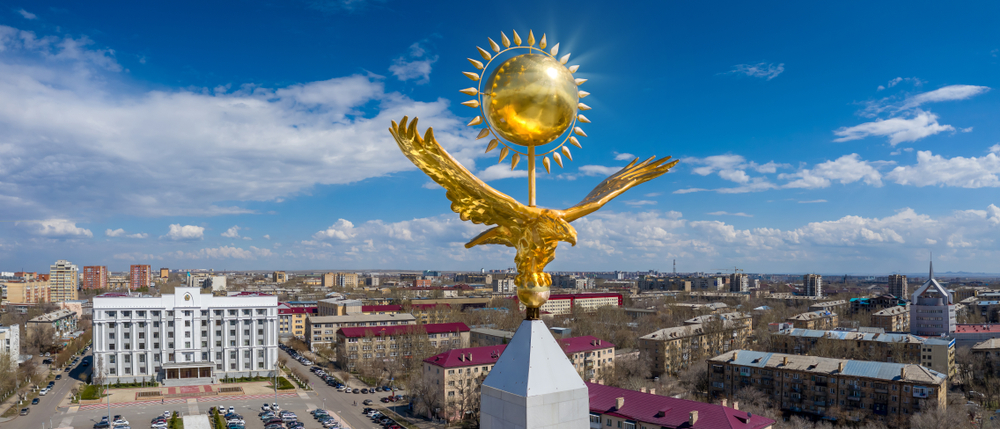ASTANA – On the eve of Republic Day in Kazakhstan on Oct. 25, Iskander Akylbayev, the chief research officer at the Kazakhstan Institute for Strategic Studies (KazISS), shared insights on the political, social, and cultural implications of the occasion in a conversation with The Astana Times.

Photo credit: Shutterstock.
“Nation-building is based on our culture, traditions, and history. Republic Day is a focal point – it brings these elements together,” he said.
Republic Day symbolizes the nation’s first step on the way to independence – the adoption of the Declaration on the State Sovereignty of the Kazakh SSR (Soviet Socialist Republic) on Oct. 25, 1990. The event was celebrated in Kazakhstan until 2009. The proposal to revive the date was put forward by President Kassym-Jomart Tokayev during the first National Kurultai (congress) in June last year.

Iskander Akylbayev.
The declaration, Akylbayev emphasized, served as both a “blueprint for envisioning the future and a potent testament to our nation’s inherent strengths.” For the first time, the document formally articulated statehood principles, encompassing aspects like integrity, territorial indivisibility and inviolability, the evolution of the Kazakh culture and language, and the fortification of national identity.
“In the wake of Kazakhstan’s independence post the Soviet Union’s dissolution, we have been strengthening our national identity one step at a time, and adjusting it to new realities, which are changing so fast today. The reintroduction of Republic Day is so important in these challenging times,” he said.
For Akylbayev, national identity is part of the culture. It shapes social behavior standards, whether in formal diplomatic arenas or casual interactions on the streets.
“The strength of our nation lies in its unity and diversity. A strong cultural backbone, a sense of belonging to a country with a rich history, a great human potential, and promising areas of economic development propel us forward,” he said.
Akylbayev observes that the younger generation is making notable strides across various sectors. He is encouraged by a greater involvement and willingness of the youth to participate in the state decision-making.
“Young people should feel confidence in their country. It should be a place where they and their children will want to live. They have a responsibility to make a positive contribution to the country’s betterment, and to improve our stature regionally and globally,” he said.
Home to more than 100 ethnic groups and 18 religious denominations, Kazakhstan has a predominantly young population, with youth comprising 30% of its total inhabitants. Data from the Kazakh Bureau of National Statistics indicates that the average age of a Kazakh citizen is 32 years.
In his student days, Akylbayev was volunteering in social projects helping people with physical disabilities, working in orphanages, and participating in local transport and logistics works.
From his perspective, these activities reveal the complexity of social dynamics and problems in financial support systems.
“All this matters to make sure no one is left behind. People need to have the same access to social support regardless of their place of residence, be it a remote village or a city. We must ensure the justice system is equally accessible, and all citizens are protected by law. This is how you build a sense of belonging and nurture patriotism,” the expert noted.
“In this regard, rather than just the written policies, it is more important to understand how public policy measures are being implemented and who is monitoring the process,” he added.
Innovations, according to him, have become part of the country’s public policy.
“Kazakhstan is standing at the forefront of digitalization. The use of digital tools in public administration can be considered as one of our success stories,” he said.
Akylbayev highlighted the example of the Astana Civil Service Hub (ACSH), noting that the initiative is a “unique project, which attracts best talents not only from Central Asia, but beyond the region.”
Since 2013, ACSH has served as a knowledge exchange platform for 42 countries. It is a flagship initiative of the United Nations Development Program (UNDP) and the Kazakh government. With a focus on the digitalization of public service delivery, the project aims to enhance the capacity of civil servants in implementing innovations in the public administration system.
In 2021, ACSH, in collaboration with the Korean government, initiated a project focused on digitalization and innovation in the public sector spanning Central Asia (encompassing Kazakhstan, the Kyrgyz Republic, Tajikistan, and Uzbekistan) and the Caucasus (including Azerbaijan, Armenia, and Georgia).
“The development of a specific area requires a comprehensive approach and the need to build a whole ecosystem. An idea can only be implemented in a suitable environment,” said Akylbayev.
In February last year, ACSH received an international award in recognition of its substantial contribution to both the practice and theory of public administration by the American Society for Public Administration (ASPA).

